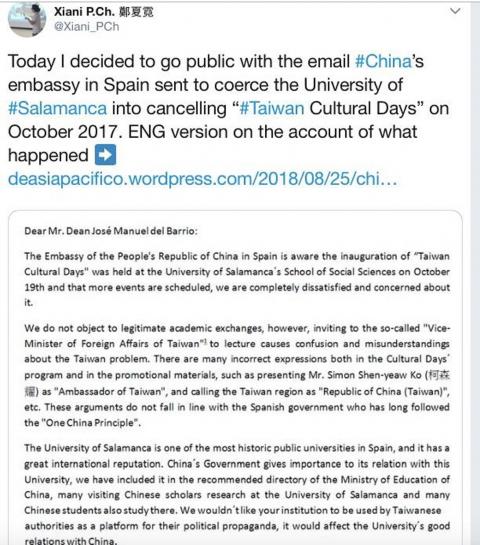Beijing’s behavior was “out of control,” the Ministry of Foreign Affairs (MOFA) said yesterday after a Taiwanese-Spanish academic said that China’s embassy in Spain pressured the University of Salamanca to cancel a Taiwanese culture event.
“Today I decided to go public with the email #China’s embassy in Spain sent to coerce the University of #Salamanca into cancelling “#Taiwan Cultural Days” on October 2017,” Shiany Perez-Cheng (鄭夏霓) tweeted late on Saturday.
Perez-Chen is a professor of international relations at the university and a leading organizer of the university’s Taiwan Culture Day.

Photo from Shiany Perez-Cheng’s Twitter account
A letter attached to the tweet that Perez-Chen said was an English-language version of the embassy’s e-mail said: “Inviting to [sic] the so-called ‘Vice Minister of Foreign Affairs of Taiwan’ to lecture causes confusion and misunderstanding about the Taiwan problem.”
“There are many incorrect expressions in the cultural days’ program and in the promotional materials,” it said. “Those arguments do not fall in line with the Spanish government, who has long followed the ‘one China principle.’”
“We wouldn’t like your institution to be used by Taiwanese authorities as a platform for its political agenda, it would affect the university’s good relations with China,” it said.
The letter demanded that the university accept the “one China” principle and take measures to “avoid and eliminate the adverse effects.”
The defilement of a storied European university is the latest instance of China’s continued persecution of Taiwan, the ministry said in a statement.
Beijing’s hinderance of Taiwanese participation in free academic and cultural exchanges is “barbaric,” the ministry said, adding that the government was dismayed and angered.
Beijing’s all-out effort to squeeze Taiwan’s international space, instead of achieving “the union of souls across the [Taiwan] Strait” touted by Chinese President Xi Jinping (習近平) in March, would serve only to invite the “anger and even scorn for China of the Taiwanese,” the ministry said.

MAKING WAVES: China’s maritime militia could become a nontraditional threat in war, clogging up shipping lanes to prevent US or Japanese intervention, a report said About 1,900 Chinese ships flying flags of convenience and fishing vessels that participated in China’s military exercises around Taiwan last month and in January have been listed for monitoring, Coast Guard Administration (CGA) Deputy Director-General Hsieh Ching-chin (謝慶欽) said yesterday. Following amendments to the Commercial Port Act (商港法) and the Law of Ships (船舶法) last month, the CGA can designate possible berthing areas or deny ports of call for vessels suspected of loitering around areas where undersea cables can be accessed, Oceans Affairs Council Minister Kuan Bi-ling (管碧玲) said. The list of suspected ships, originally 300, had risen to about 1,900 as

Japan’s strategic alliance with the US would collapse if Tokyo were to turn away from a conflict in Taiwan, Japanese Prime Minister Sanae Takaichi said yesterday, but distanced herself from previous comments that suggested a possible military response in such an event. Takaichi expressed her latest views on a nationally broadcast TV program late on Monday, where an opposition party leader criticized her for igniting tensions with China with the earlier remarks. Ties between Japan and China have sunk to the worst level in years after Takaichi said in November that a hypothetical Chinese attack on Taiwan could bring about a Japanese

MORE RESPONSIBILITY: Draftees would be expected to fight alongside professional soldiers, likely requiring the transformation of some training brigades into combat units The armed forces are to start incorporating new conscripts into combined arms brigades this year to enhance combat readiness, the Executive Yuan’s latest policy report said. The new policy would affect Taiwanese men entering the military for their compulsory service, which was extended to one year under reforms by then-president Tsai Ing-wen (蔡英文) in 2022. The conscripts would be trained to operate machine guns, uncrewed aerial vehicles, anti-tank guided missile launchers and Stinger air defense systems, the report said, adding that the basic training would be lengthened to eight weeks. After basic training, conscripts would be sorted into infantry battalions that would take

DEEP-STRIKE CAPABILITY: The scenario simulated a PLA drill that turned into an assault on Taiwan’s critical infrastructure, with the launchers providing fire support Taiwan yesterday conducted this year’s first military exercises at Longsiang Base in Taichung, demonstrating the newly acquired High Mobility Artillery Rocket System’s (HIMARS) ability to provide fire support and deep-strike capabilities. The scenario simulated an attack on Penghu County, with HIMARS trucks immediately rolling into designated launch areas and firing barrages at the Wangan (望安) and Cimei (七美) islands, simulating the provision of fire support against invading forces. The HIMARS are supposed to “fire and leave,” which would significantly increase personnel and equipment survivability, a military official said. The drill simulated an exercise launched by the Chinese People’s Liberation Army (PLA) Eastern